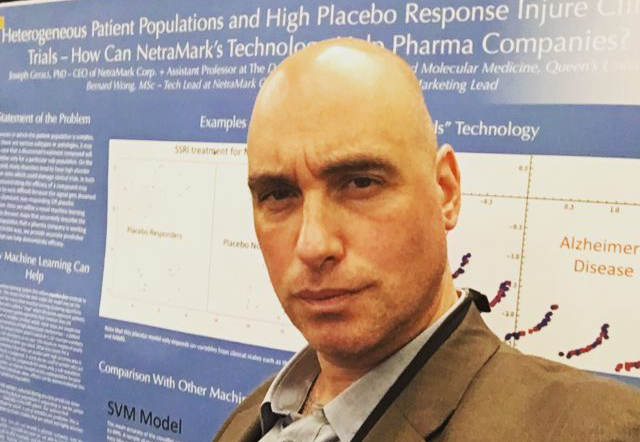As part of a regular series powered by Microsoft, BetaKit interviews prominent Canadian CTOs speaking earnestly on the biggest challenges they face in their role, as well as future technology predictions in their space.
If you were to start a company in the pharmaceutical machine learning space, you would probably want someone on your team with experience in medical science. And mathematics. Some machine learning would probably be helpful as well. NetraMark has all that in one person: founder Dr. Joseph Geraci.
Dr. Geraci leads a 10-person team at NetraMark to help pharmaceutical companies with clinical trials and drug development. Together with his team, Dr. Geraci has developed innovative ways of executing machine learning on small data sets as well as quantum machine learning— the intersection of machine learning and quantum computing.
From academia to startups
The startup world is new to Dr. Geraci, whose background is in academia. Holding a PhD in mathematics and postdocs in oncology, machine learning, and psychiatry, Dr. Geraci’s work as an academic was straightforward in its approach, but required creativity in how to make sense of the data.
“The main difference is that in medicine and academia, where I was leading people and engineers that were doing data science, the agenda was very clear,” Dr. Geraci said. “We had to figure out a way to integrate different types of data and make sense of patient data. But we were using standard methods.”
“It was quite derivative,” Dr. Geraci said.
At NetraMark, though, the agenda is different. “We use neural networks and tree-based methods…but we’re inventing totally new machine learning paradigms that we’re not interested in publishing,” Dr. Geraci said. “We’re interested in having a massive impact and making our investors very rich.”
The value of small data
By virtue of working in the medical science space, the amount of data that researchers, physicians, and biomedical engineers have access to is comparatively smaller than other sectors.
“You need to have some love for what you’re doing. If not, then don’t even bother. You can make a lot more money working for Facebook.”
“A clinical trial with 300 people costs millions of dollars,” Dr. Geraci said, noting how the costs add up quickly, between working with DNA and placebo arms of drugs, among other things. “It’s very expensive and it’s very difficult to collect 15,000 data points.”
While he believes the industry will one day get to the point where it can be dealing with larger data sets, for now, there is an ability to create a ton of value by working with small data sets. This is part of what makes NetraMark’s offering to its users unique, Dr. Geraci said.
“When a medical doctor interacts with our system they love it, because they’re able to… interact with our patient population, but according to a high-dimensional model,” Dr. Geraci said. “The proximity of the patients to each other is reflective of some high-dimensional relationship. You can query the machine and say ‘it’s these genes that are driving this subpopulation,’ or whatever it is.”
The problem with black boxes
Often, when things like machine learning or quantum machine learning are discussed, there’s a conception that what happens between the input and the output is a black box that can’t be seen or understood. Dr. Geraci disagrees vehemently with this.

“I worked in quantum gravity. And I’ve looked at the foundations of reality,” Dr. Geraci said. “This idea that this little neural network is doing stuff I don’t understand is bull—.”
NetraMark offers its users the ability to understand why the models made certain decisions by letting them query the machine. This is especially important to the medical vertical where NetraMark operates.
“They need to know why a machine is making a decision because it can kill someone,” Dr. Geraci said, frankly.
Quantum machine learning is the future
Though still in its infancy, NetraMark is working with quantum machine learning. “It still can’t do anything better than the laptop open in front of you,” Dr. Geraci admits, though the applications of it are starting to be seen.
Dr. Geraci has been dreaming of modelling lung cancer using quantum machine learning. And two weeks ago, his team accomplished it, he said. “It is able to learn how to distinguish between two different types of lung cancer with almost perfect accuracy.”
“It’s a humble art,” Dr. Geraci said of the technology. “It’s something that I believe will transform our lives. We’re going to understand things about our body and about the world that is impossible to know with our technology now.”
“It’s like having a baby.”
In giving advice to future entrepreneurs who want to become technical leaders at startups, Dr. Geraci stresses that you be passionate about the problems you are solving.
“It’s like having a baby, but if you don’t have a baby you don’t know what it’s like,” Dr. Geraci said. “You have this hungry monster constantly demanding your attention.”
“You need to have some love for what you’re doing,” Dr. Geraci said. “If not, then don’t even bother. You can make a lot more money working for Facebook.”

